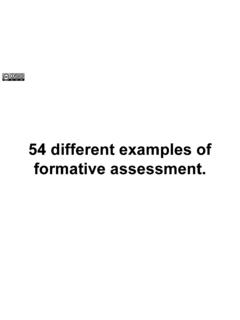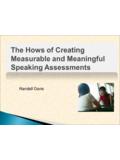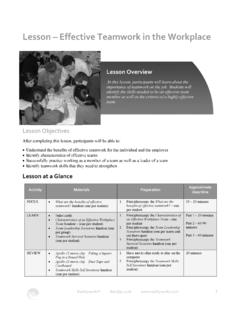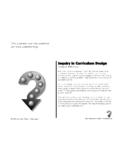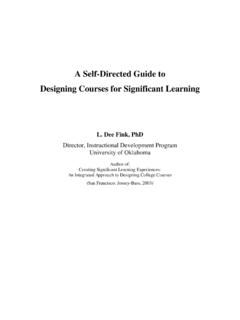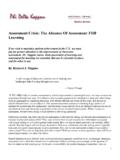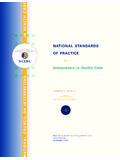Transcription of SOCRATIC SEMINARS: GUIDELINES G W UTHENTIC …
1 SOCRATIC seminars : GUIDELINESGRANT WIGGINSAUTHENTIC EDUCATION 2004page 1 The following ideas, roles, criteria, and scoring strategies can be usedto assess and improve the quality of any student group are designed to help teachers enable students to becomeincreasingly self-regulating and self-disciplined about their seminarwork. A seminar is devoid of any intention to add to collectible stores of information; it hasno relation to newness or oldness of knowledge. One becomes intent on thinkingthings anew rather than thinking new is a seminar?A seminar is a genuine discussion. As the opening quote suggests, a seminar ismeant to be a different kind of class (or instructional strategy). The seminar isdesigned to enable students to explore a text, a problem, an experience; it is not amore conversational form of teacher-led instruction.
2 Rather, it is the students opportunity to ask and consider questions and explore each others answers. In short,it becomes the student s opportunity and responsibility to develop habits and skillsthat are traditionally reserved for the seminar experience rolls content and process into one. The student not onlylearns more about an idea or text, the student learns how to discuss it: the studentgains practice in leading discussions, listening for insights in the comments of others,proposing alternative paths of conversation, insuring that quiet or weird voices areheard, and how to help talk move beyond superficial but unconnected sharing tosustained and thought-provoking SEMINAR: GUIDELINES Authentic Education 2004page 2 What a seminar isn t.
3 A seminar can perhaps be better understood by considering whatit is not: it is not training; it is not interactive lecturing; it is not canned studentspeaking (like the 19th century recitation. ) A seminar is neither a debate nor ateacher led class discussion (where discussion means students taking turnssharing thoughts, feelings, and reactions). Rather, the seminar is a collective inquiryinto questions and issues, typically prompted by a reading or shared experience. Akey aim is to develop everyone s understanding of the issues not to be confusedwith answering the teacher s questions. But it also aims at everyone s self-understanding through speaking, idea testing, listening, and reflection. The purposeis to uncover not cover a teacher may well have to learn and practice new habits, therefore.
4 In a seminar,the teacher becomes a mature co-colleague in the conversation (after some initialtraining and modeling). The great challenge for the teacher is to break habits to veryself-consciously try to stop managing all the talk and leading students to an seminar leader s job is more like that of a counselor, therapist, or spiritual leader:to keep the important issues alive and to keep important voices, perspectives or paststrands of talk from getting lost. Initially one must direct and train. But once studentshave grasped the new purpose, routines, and norms at work, the teacher can becomeless of a teacher and more like a coach as students manage their team performance. In advanced seminars , the teacher becomes even less obtrusive morelike the aim of a seminar is not to replace or jazz up instruction, then, but to supplementit.
5 The seminar works best as a precursor to or synthesizing experience of traditionaldidactic teaching and skill coaching The seminar presents students with chances toexplore the meaning of the work (assignments, lessons, discrete learnings) that makeup their formal A seminar works best when the issues arise naturally out of prior work and experience. What is my job? Students must come to know that their job is different. It is not to sitpassively and await instruction or answers, or only to say whatever pops into theirmind. Their job is to come to a common and an individual understanding of whatsomething means. In the broadest sense, the goal is to make sense of a text -- be thetext a book, a story heard, a video, or a shared experience; and to bring the wholeSOCRATIC SEMINAR: GUIDELINES Authentic Education 2004page 3group along on the quest for meaning as much as possible what we like to callIntellectual Outward Bound.
6 This student freedom and responsibility takes somegetting used to. Habits and expectations run deep: students will typically glancetoward the teacher during each lull, to find out the next move in the conversation(even if the teacher has worked hard to shed the mantle of traffic cop andauthority). A key understanding occurs when a student realizes that the seminar isonly as engaging and effective as what each person puts into teachers report happily that good seminars often improve student preparationfor class and decrease student absence. A good seminar often becomes as engagingand compelling as team sports or putting on a play: the talk becomes so importantthat to get a later summary just won t do. Leadership and maturity often arise fromsurprising sources, too.
7 Learners who may not have been effective or outgoing in ateacher-led class may well shine as seminar leaders. Alas, the opposite happens, too:seemingly bright and able students may become sadly timid and anxious when theTeacher is no longer the All-Knowing Arbiter of Truth. Be prepared, too, for losingyour bearings as a teacher, especially at first. You may misjudge success or failure bybasing your evaluation too much on your own feelings of being in or out of control ofthe process. Often the best seminars feel out of control as teachers shed the role oftour director; discussions that seemed to go well may only have felt that way becauseit was a smooth flow toward good answers. So, seek feedback from students,videotape, and student work to test your perceptions against the texts, questions, or problems lend themselves more than others to seminarwork.
8 So-called great books are ideal for seminars , as many learn in college: theyare great precisely because they raise as many questions as they answer; we projectdifferent meanings into the text, leading to lively argument; and they focus on bigidea questions. Organizing a seminar around provocative essential questions andtexts that offer different compelling perspectives on those questions is thus aneffective entry point: students come to see quickly that the text is a means to an end,that the ideas come to life in a free-wheeling dialogue, and that a good text profitsfrom re-reading and SEMINAR: GUIDELINES Authentic Education 2004page 4 The seminar can be as loose or structured as a facilitator desires. But with pre-collegestudents, being clear about the forms and rituals of seminar is useful, especially atfirst, since a new form and function is being tried out.
9 Deliberate training in the newroles is therefore vital. Below, the reader will find examples of how more explicitstructures -- roles, rules, and relationships -- can be designed to make theconversation more deliberately productive and focused. (A full set of seminar rubricsis available in a separate handout). But no set of rules can substitute for your soundjudgment, good ears and eyes, and tact. For, at bottom, the seminar is co-operativelearning at its best: finding whatever ways we can to insure that everyone feelsincluded and competent as a seminar SEMINAR: GUIDELINES Authentic Education 2004page 5 SEMINAR DESIGN & TACTICS1. FACILITATING QUESTIONS TO BE ASKED AT OPPORTUNE TIMES ANDLEARNED BY STUDENTSThe questions below are not just your facilitative moves.
10 Students should be trained touse these strategies, to see them as their moves, on the field of play, as it were. Thesevital roles involve some unnatural habits. Make them explicit; get everyone to be meta-cognitive about them, even if it seems awkward at first. Try assigning the roles for aperiod of time to different students. Of course, there needs to be a modeling of them,feedback about their use, and incentives for using them if they are to stick. a. What question are we trying to answer? Why?b. Could you give me an example or a metaphor to explain that?c. Can you find that in the text? Where does the reading support you?d. What are you assuming in that argument?e. But what (That seems at odds with what we said before, what the authorsaid here, etc.)
